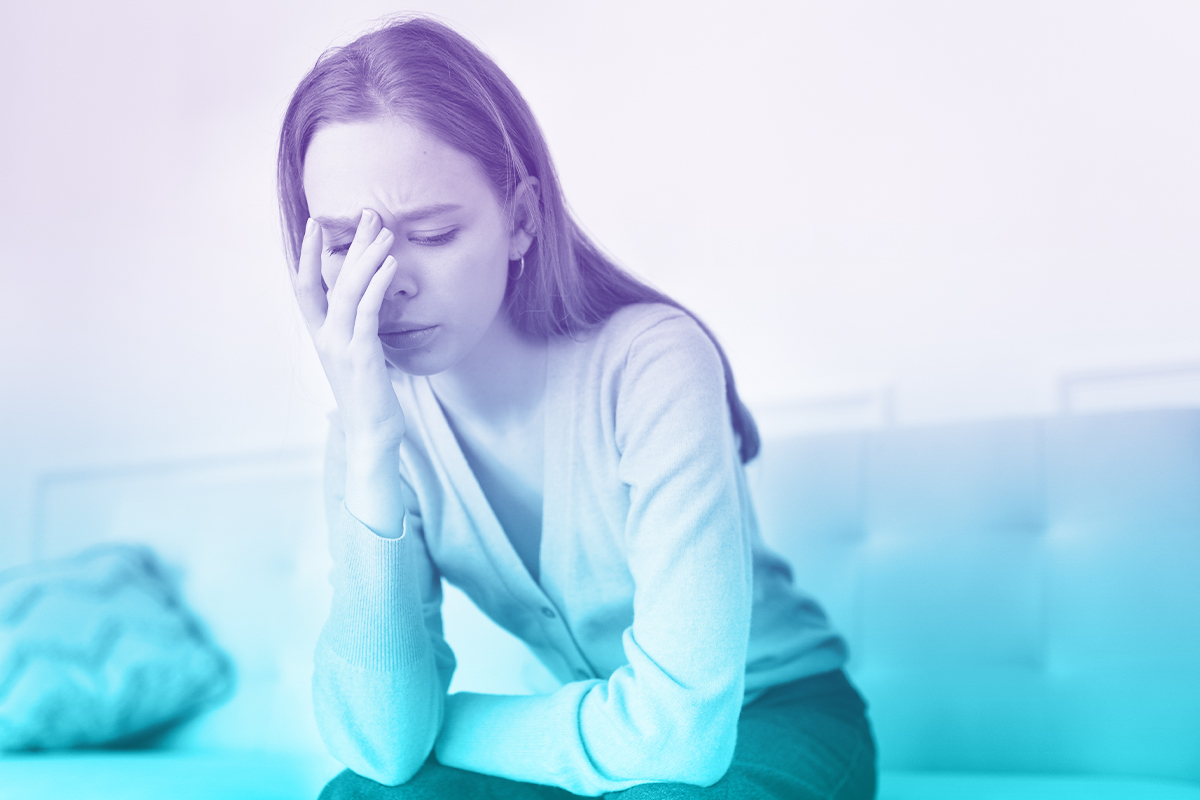Get Clean! Call us today!
Anxiety Treatment
“Trust yourself. You’ve survived a lot, and you’ll survive whatever is coming.” – Robert Tew
The idea of needing help for mental health is scary, almost as scary as facing your anxiety day in and day out. Clean Recovery Centers has an expert team dedicated to providing compassionate and respectable care.
Anxiety disorders can make you afraid, fearful, and overwhelmed – we understand that. We are here to treat anxiety disorders, substance use disorders, and co-occurring disorders in a safe and comfortable environment. No matter what brought you to this page, we are here to help with all your anxiety needs.

What We Treat – Anxiety Disorders Defined
Anxiety is defined as experiencing feelings of fear, dread, uncertainty, and uneasiness. This is normal in day-to-day life, and it is okay to feel nervous or fearful before starting a new job or meeting someone new for the first time. However, when these symptoms begin to interfere with tasks and goals, it may be a sign of an anxiety disorder.
There are different types of anxiety disorders, though many have similar symptoms. Undiagnosed anxiety can have you trying different things to relieve your symptoms. Some even turn to substance use just to get a sense of relief. Here at Clean Recovery Centers, we treat anxiety disorders, substance use disorders, and co-occurring disorders.
How We Treat Anxiety Disorders at Clean Recovery Centers
At Clean Recovery Centers, we understand how different anxiety disorders can present and cause difficulties. We provide an individual assessment to come up with the best course of action for your treatment. Our unique, three-phase approach follows this path for anxiety disorders:
- Phase I (preparation): Phase I is for those taking substances and includes a medical detox and residential I stay. If you are managing anxiety and substance use disorder, this is the first step in treatment. We ensure your comfort and safety while you begin the healing journey to recovery.
- Phase II (action): Phase II is divided into two paths. Those who are transitioning from phase I may continue on the substance use disorder path depending on their needs or transition to the mental health path. Those looking for mental health treatment only will begin in phase II. During the mental health path of the action phase, you will stay onsite for residential II treatment. You will be assessed by our compassionate staff to find out what treatments may work best for you. This will include various therapies and possibly medication. Once residential II is complete or when your care team sees fit, you will transfer for further care into our partial hospitalization program (PHP).
- Phase III (maintenance): Phase III is the transition to intensive outpatient programming (IOP) and outpatient services. You will continue to build on the progress made in phase II while learning skills needed in everyday life. The goal is to have strong coping skills and therapy techniques to help you face anxiety as you return to your life outside of treatment.

Types of Anxiety Disorders
Anxiety can come in different forms resulting in different symptoms. While many symptoms overlap, there are specifics to each anxiety disorder. The most common anxiety disorders include:
- Generalized anxiety disorder (GAD): one of the most common types of anxiety. GAD refers to intense worry about life stresses including money, work, and relationships. The worry is excessive and interferes with everyday tasks.
- Panic disorder: experiencing panic attacks. Those with panic disorder will have bouts of intense and sudden fear when there is no perceived danger around. This defines panic attacks, and those with panic disorder will experience them as little as 2 times a year to multiple times per day.
- Phobias: intense fear of a person, place, or thing. Phobias are common and include spiders, clowns, flying, and more. The person experiences worry and a sense of danger when confronted with the phobia.
- Social anxiety: fear of others’ opinions. Social situations may feel overwhelming and embarrassing to someone with social anxiety. Going to work or hanging out with friends can trigger fear and judgment, making the person avoid these situations.
How Common Are Anxiety Disorders?
Besides depression, anxiety is one of the most common mental health disorders plaguing Americans. In 2023, 32.3% of U.S. adults aged 18 and older experienced symptoms of anxiety and/or depression. The age group with the highest percentage was those aged 18-24, sitting at 50%.
Here in Florida, almost 41% of adults experienced symptoms of anxiety and/or depression in 2021. In Hillsborough County, the rate per 100,000 of emergency department visits from mental health disorders (excluding those related to substances or alcohol) was almost 540 in 2022, rivaling the state average. Mental health is a serious concern in both Florida and the U.S., showing the need for treatment providers. Anxiety can be managed, and options for therapy and medication need to be accessible.
Symptoms of Anxiety Disorders
A common symptom across anxiety disorders is intense fear and worry, typically when there is no perceivable threat. These fears result in physical symptoms including increased heart rate, sweating, nausea, headaches, and body aches. However, each anxiety disorder will have one or a few differentiating symptoms.
GAD tends to be persistent, with symptoms of worry, fatigue, and aches and pains lasting months. Panic disorder results in panic attacks, where the person feels intense fear, trembling, chest pain, and impending doom for a matter of minutes. The frequency of panic attacks varies from person to person.
Those with social anxiety and phobias tend to only experience fear when met with the situation or object. They may go out of their way to avoid the fear, to the point it interferes with their daily lives. For those with social anxiety, this means doing what they can to prevent social interaction. Those with phobias will make arrangements to prevent encountering the phobia, such as driving a long distance to avoid flying.
What People Are Saying
 Clean Recovery Centers - Sarasota
Clean Recovery Centers - Sarasota
 Clean Recovery Centers - New Port Richey
Clean Recovery Centers - New Port Richey
 Clean Recovery Centers - Largo
Clean Recovery Centers - Largo
What Causes Anxiety Disorders?
Anxiety can stem from a combination of different factors, including genetics, environment, and predispositions. Those who are already shy or withdrawn in new situations during childhood are more likely to develop anxiety as they get older. Other risk factors include:
- Having a family history of anxiety or other mental health conditions
- Experiencing traumatic events during childhood including divorce, substance use, frequent moves, and poverty
- Having a sensitivity to caffeine
- Taking substances – they can worsen anxiety or lead to it
- Living with a physical condition such as thyroid issues or arrhythmia (irregular heartbeat)
There is no gene or set of genes that marks having or developing an anxiety disorder, but family history does have some correlation. These factors do not guarantee anxiety, but they do increase the risk of developing it. Those taking substances can experience anxiety symptoms between doses as withdrawal begins. If they already have an anxiety disorder, stimulants such as cocaine can make symptoms much worse and lead to a mental health crisis.
What Is an Anxiety Attack?
Although it is not a medical term, an anxiety attack is a description of what someone feels when experiencing overwhelming anxiety symptoms. Though not the same as a panic attack, an anxiety attack can have similar symptoms including sweating, trembling, mood swings, and chest pains. The difference is that panic attacks have a definitive trigger – the person sees, hears, or feels something that causes intense fear whether warranted or not. Anxiety attacks can occur at any time and have no real trigger.

Who Can Diagnose Anxiety Disorders?
Anxiety disorders are medical conditions and can only be diagnosed by a medical professional such as your family doctor, a psychiatrist, or mental health nurse practitioner. The process involves assessments of both your physical and psychological symptoms. The doctor may order blood work and perform a physical exam to rule out other health conditions before making a diagnosis. As we mentioned above, some thyroid and heart issues can cause anxiety symptoms, so the doctor will need to make sure these are not causing your anxiety. After completing the physical exam and listening to your symptoms, the doctor will be able to make a diagnosis.
An anxiety disorder diagnosis is not something to be ashamed of, and your doctor will work with you to find treatment options that best suit your needs. Our team at Clean Recovery Centers can treat anxiety with therapy and possible medications in our mental health program.
Get Help for Anxiety Disorder Today in Hillsborough County, FL
Experiencing anxiety can have you feeling so fearful you miss out on important life events. Anxiety disorders may be permanent, but they are treatable and manageable. There is nothing stopping you from getting back to what matters to you most. Mental health care is crucial, and seeking treatment for your anxiety is the first step to a better tomorrow. Clean Recovery Centers has a full-spectrum anxiety disorder treatment program along with substance use for those with co-occurring disorders.
If you or someone you love is managing an anxiety disorder, don’t be afraid to reach out for help. Clean Recovery Centers not only utilizes a unique, three-phase approach, but also wellness components including massage therapy, therapeutic exercise, and more to help you discover new and healthy coping skills. Whether you are taking substances to manage anxiety or just looking for mental health help, we are here for you. Call us today at 888-330-2532 to learn more about our program offerings.
Get clean. Live clean. Stay clean.
Frequently Asked Questions About Anxiety Disorder Treatment
Can an anxiety disorder be treated without medication?
Anxiety disorder can be treated without medication by using different therapy techniques and developing healthy coping skills.
